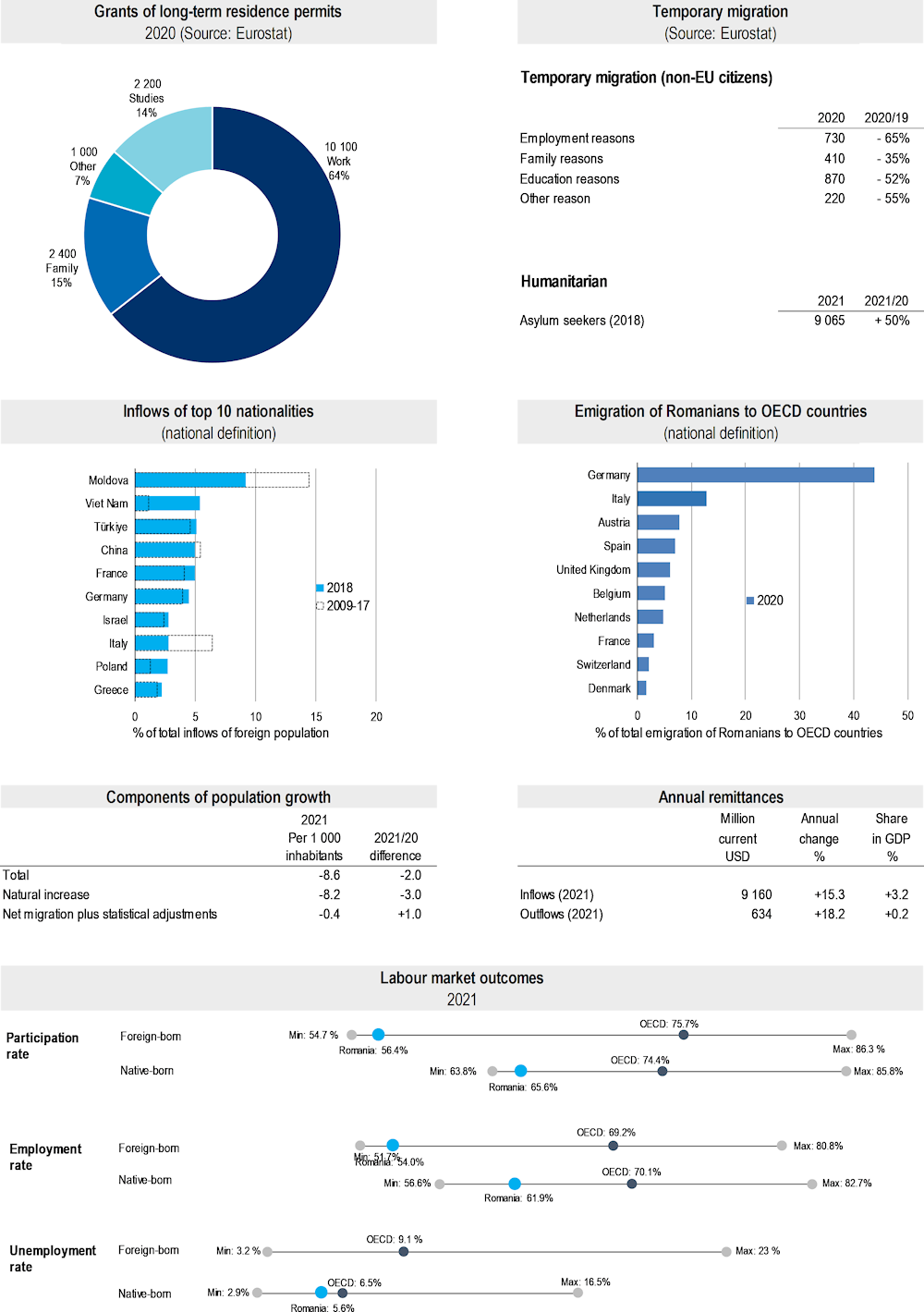In 2020, 16 000 new immigrants obtained a residence permit longer than 12 months in Romania (excluding EU citizens), ‑29.2% compared to 2019. This figure comprises 64.4% labour migrants, 15.3% family members (including accompanying family), 13.8% who came for education reasons and 6.5% other migrants. Around 900 short-term permits were issued to international students and 700 to temporary and seasonal labour migrants (excluding intra-EU migration). In addition, 18 000 intra-EU postings were recorded in 2020, an increase of 12% compared to 2019. These posted workers are generally on short-term contracts.
In 2021, the number of first asylum applicants increased by 50.5% to reach around 9 100. The majority of applicants came from Afghanistan (3 900), Syria (1 200) and Bangladesh (900). The largest increase since 2020 concerned nationals of Afghanistan (1 500) and the largest decrease nationals of Syria (‑250). Of the 4 100 decisions taken in 2021, 28% were positive.
The National Strategy on Immigration 2021‑24 was published in September 2021. Priority was given to ensuring the legality of foreign residence, combating illegal migration and undeclared work, and ensuring unrestricted access to the asylum procedure.
The Strategy has three general objectives. The first concerns migration for economic reasons. The emphasis is on limiting entries rather than on the integration of those who are already in the country. Specific aims include simplifying the means of access by foreigners for work, posting or investment and combating illegal migration. The second objective deals with international protection. Among specific measures are an asylum applications system in accordance with national, European and international legal standards, better conditions of reception and assistance for asylum seekers, relocation of refugees and asylum seekers and greater co‑operation with other European and international bodies concerned with asylum. The third objective concerns procedures for dealing with large‑scale migration waves generated by crises, such as those in Syria or Afghanistan, and is focused on avoiding security threats.
Specific Government Orders in 2021: introduced changes to improve the protection of residence permits against counterfeiting, including the use of biometrics; set out annual quotas of work authorisations for foreigners, including a doubling of foreign workers newly admitted to the Romanian labour market; amended conditions for posting of workers to Romania and for Romanians working abroad; transposed EU Directive 2016/801 on conditions of entry and residence of third-country nationals for the purposes of research, studies, training, voluntary service, pupil exchange schemes or educational projects and au pairing.
In November 2020, Romania adopted measures relating to Brexit. UK citizens and their family members who resided in Romania and wished to remain there after 31 December 2020 were required to register with the Romanian immigration authorities for the new residence status before 31 December 2021.
In response to the COVID‑19 crisis, immigrants with temporary visas who were unable to return had their visas automatically extended. The validity of all documents which expired during the national emergency/alert state was extended for 90 days following the cessation of restrictions. Asylum applications continued to be lodged and processed as usual.
Emergency Ordinance no. 20/2022, effective from 11 March 2022, outlined measures dealing with the inflows resulting from the war in Ukraine. Ukrainian citizens can work in Romania based on a full-time individual work agreement without a work permit and without observing the nine months in a year limit for an employment agreement, as under the normal rules. In addition, the right of residence for work purposes is extended without the need to obtain a long-stay working visa. Ukrainians may also receive free emergency medical care and qualified first aid treatment through the national health care system and be included in national public health programmes. Individuals hosting foreign citizens or stateless persons coming from the area of the armed conflict in Ukraine may be reimbursed for food expenses on a per diem basis.
For further information: www.alba.insse.ro | www.mai.gov.ro | www.igi.mai.gov.ro

